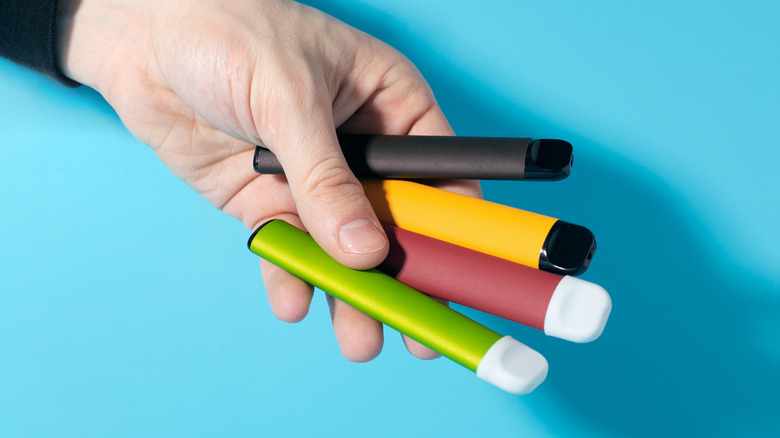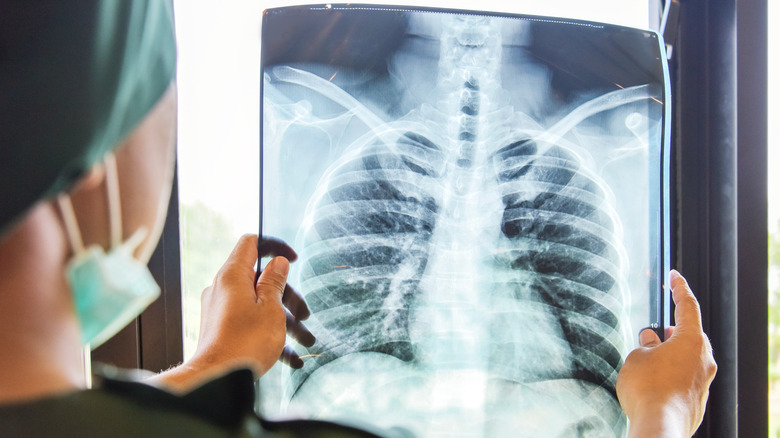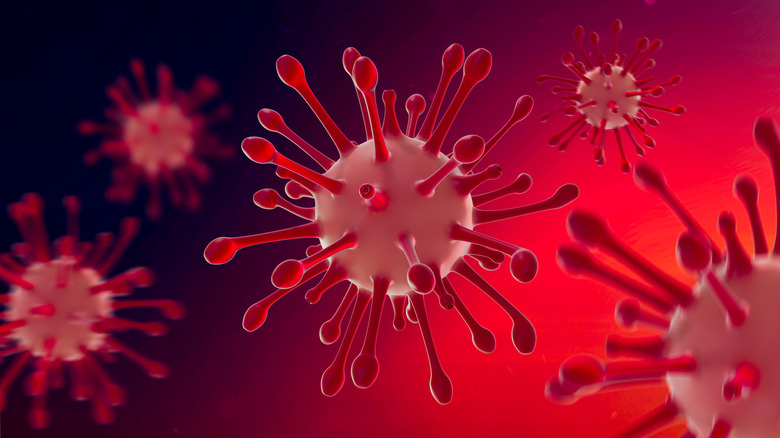When You Vape Every Day, This Is What Happens To Your Body
If you think about it, it's not all that surprising that we now have "vaping" by means of electronic cigarettes (aka e-cigarettes). After all, there's e-learning, e-commerce, e-books—heck, even when spelled without the dash, email is still short for "electronic mail." However, e-cigarettes are still fairly new, and so there's quite a bit we're continuing to learn about them.
But first, let's cover the basics. Unlike a traditional cigarette, an e-cigarette is a battery-operated device with a chamber that superheats liquid, converting it into inhalable vapors (via WebMD). And what's in this vaping liquid? That varies, but it can contain nicotine as well as other chemicals, including ones that add different flavors, which brings us to the elephant in the room.
There's been debate about whether or not e-cigarettes are safer than regular cigarettes, or if they're safe at all, according to WebMD. The FDA regulates vaping products. And unlike traditional cigarettes, e-cigarettes don't always contain nicotine, which as any former smoker will tell you is very addictive. On the other hand, some believe e-cigarettes are more attractive to kids, and some studies show that children who vape are also more likely to smoke. Since scientists are still gathering data on vaping, the debate continues. But as Dr. Neal Benowitz told WebMD, while most experts agree vaping is less dangerous than smoking, that doesn't mean vaping is completely safe.
Research suggests vaping causes popcorn lung
While popcorn, the food, is associated with fun activities like movie night, popcorn lung, the medical condition, is a serious matter. Also known as bronchiolitis obliterans, this disease occurs when your lungs' airways are damaged, making it harder for you to take in air (via Healthline).
Basically, you can think of your respiratory system like an upside-down tree. When you breathe in, the air travels down your trachea (the trunk) into your two bronchi (large branches), which then split off into the airways inside your lungs called bronchioles (smaller branches). If you have popcorn lung, your bronchioles become scarred and narrow, which can lead to coughing, wheezing, and shortness of breath (via Healthline). And chemicals like diacetyl and pentanedione, which are used in vaping products, can cause popcorn lung. In fact, as Healthline notes, bronchiolitis obliterans is a type of e-cigarette or vaping use-associated lung injury (EVALI).
There is one piece of good news. This medical condition is very rare (via Healthline). However, you are increasing your chances of developing it if you use vaping products.
What you need to know about vaping and nicotine addiction
Okay, it's time to answer one of the biggest questions about vaping. Is vaping more or less addictive than regular cigarettes? To be fair, not all vaping liquids contain the addictive chemical known as nicotine, but as Verywell Mind explains, vaping nicotine can actually be more addictive than smoking it.
Remember, an e-cigarette is a device, which means you can make alterations to it, including increasing its voltage so that it delivers more nicotine per puff (via Verywell Mind). Add to that equipping an e-cigarette with an extra-strength cartridge that has higher levels of nicotine, and suddenly you have a recipe for not only developing a nicotine addiction but also developing it faster than you would with traditional cigarettes.
And there's still one more thing to consider. According to Verywell Mind, researchers are finding evidence that vaping nicotine can be a gateway drug. Now, in one sense, this is nothing new. The National Institute on Drug Abuse has stated that becoming addicted to nicotine can lead to cocaine use. But when you tie into that how e-cigarettes can give you higher nicotine levels, suddenly, the possibility of trying hard drugs may come on faster.
Vaping has the potential to cause cancer
The liquid used in e-cigarettes can have different types of chemicals. But what if you use a liquid that doesn't contain nicotine? Wouldn't removing that addictive substance make vaping safe? Well, in terms of developing a nicotine addiction, yes, of course. But that doesn't mean what you're inhaling is harmless.
The chemicals in vape juice can be toxic even if a particular juice's formula doesn't include nicotine. A 2015 study in the New England Journal of Medicine found heating up glycerol and propylene glycol, both of which are found in vaping liquids, can create new compounds. Makes sense, but a byproduct of this is the release of formaldehyde. Yes, that formaldehyde. Besides being a widely-used embalming fluid, it can also cause cancer.
In addition, a 2018 study in Pediatrics found that adolescents who smoked only e-cigarettes had notably higher levels of toxic chemicals in their urine when compared to non-vapers and non-smokers from the same age bracket (via Medical News Today). And still other researchers have found that the super-heated chemicals in vape juice can be very dangerous to the cells in your lungs (via The BMJ). In short, whether or not you vape nicotine, vaping can still be risky to your health.
Oral health issues can result from vaping
We've all heard the warnings about how smoking is bad for your teeth and gums, but what about vaping? Well, researchers are still exploring this, but findings indicate that e-cigarettes do less damage than traditional ones (via Healthline). However, even less damage can still be significant for your oral health.
According to Healthline, vaping can lead to your mouth becoming dry and irritated. It also can cause gum inflammation and raises your risk of developing cavities and gum disease. This is because the vapors created by e-cigarettes expose your teeth to bacteria. And the very nature of those vapors mean that bacteria can really get into your teeth's crevices. But most troubling of all is how vaping affects the cells in your mouth.
Remember, our cells are always dividing and growing. When this natural process is disrupted, it can be detrimental for your health. As Healthline notes, research is finding that vaping can age our cells faster, causing them to die. This might lead to a number of health issues, including tooth and bone loss, as well as periodontal diseases. So, if you vape, let your dentist know, so they can catch these issues early.
Vaping can cause lipoid pneumonia
When most people hear the word "pneumonia," images of someone getting the flu and winding up in the hospital usually come to mind. Lipoid pneumonia, however, is different because unlike the well-known type of pneumonia, it isn't caused by a virus (via Health). But that doesn't mean you shouldn't take it very seriously.
The culprits for lipoid pneumonia aren't viruses, fungi, or even bacteria but fatty acids called lipids. As pulmonologist Andrew Freeman explained to University of Utah Health, lipids can be in vaping liquids. "When large enough amounts of lipid droplets are inhaled into the lungs, they can cause irritation and damage to the lung, leading to the condition termed lipoid pneumonia," he said. And according to University of Utah Health, symptoms can include coughing up blood, chest pain, problems breathing, and chronic coughing.
Thankfully, lipoid pneumonia can be treated. Steroids can help treat the condition (via Health). But don't attempt to "ride it out" on your own and not seek medical help. Like viral and bacterial pneumonias, lipoid pneumonia can be fatal if you don't get proper treatment.
Vaping may increase your chances of developing clinical depression
The word "depressed" gets thrown around quite a bit. Sometimes, it's used in an exaggerated way to make a point like when someone says "this rain is making me so depressed." What they really mean is the rain is making them feel sad. But actual depression is more than just being down. It's a serious medical concern, and vaping can increase the chances of developing it.
In a 2019 study published in JAMA, researchers found that if you look at the general population, the percentage of people with depression is 4.5%. But that number jumps to 9.1% if you just look at people who use e-cigarettes. And in a different study involving 900,000 adults, "the researchers found that 34% of current e-cigarette users reported having experienced clinical depression, compared with 15% of those who had never vaped" (via Medical News Today).
This is all concerning, but another major finding is who among e-cigarette users are most likely to develop depression: adults aged 18 to 25 years old. If you or someone you know has depression and uses e-cigarettes, now's a great time to quit vaping.
Is vaping dangerous for your heart?
Understandably, when it comes to vaping and possible health risks, most people immediately focus on the lungs. But, remember, what you breathe in affects your whole body, and although more research is needed, early findings indicate vaping may lead to heart issues (via Healthline).
Now, let's be fair about this. So far, researchers have found that smoking is still more dangerous than vaping. With that said, a 2018 report from the National Academies Press found vaping nicotine can increase your heart rate and your blood pressure, both of which can cause problems down the road. Another study, this one published in The American Journal of Medicine, didn't specifically link e-cigarettes to heart disease, it did find that smoking and vaping can both increase the likelihood of developing heart disease. Additionally, a 2018 study in Stroke found using e-cigarettes is connected to an increased chance of experiencing heart attack, stroke, and angina (pressure or pain in your chest).
Can vaping affect your heart in the long term? That's something researchers are still exploring (via Healthline). Nevertheless, if you vape and have experienced any issues with your heart, it's time to have a serious discussion with your health care professional.
Beware of the toxins in vapors
If you ask a group of e-cigarette users about their favorite vape juice flavors, you'll get a variety of answers ranging from mint to banana cream pie. Yes, there are many different vaping liquids on the market, but you might be breathing in more than what you see on the label.
A 2018 University of Rochester Medical Center study found the chemicals used to flavor some vaping liquids can cause inflammation and tissue damage in the lungs. In addition, a 2017 study published in Environmental Research found the vapors inhaled during vaping can contain toxic materials like nickel, lead, chromium, and manganese, which have been connected to brain damage, cancer, and respiratory issues (via Medical News Today).
While the research found fairly small amounts of the metals in the vape juice studied, the bigger culprit was the heating coil in the e-cigarette. During the heating process, these metals (which are components of the coil) can leak into the vape juice (via Medical News Today). And if a vaping liquid already has potentially dangerous chemicals in it, then you may have a recipe for serious health concerns.
Should you vape with coconut oil?
A popular trend is substituting something made from chemicals with something all natural and arguably healthier (at least by comparison). And this goes beyond foods like artificial sweeteners. Case in point: using coconut oil in an e-cigarette in place of manufactured, chemical-filled vaping liquids. But is this safe?
As Dr. Chris Airey told Healthline, "Simply put, your lungs aren't meant to process fats and oils via inhalation." He added that inhaling even small amounts of coconut oil during oil pulling can lead to the development of lipoid pneumonia. Oil pulling is when a person swishes oil around inside their mouth and forces it between their teeth (via Verywell Health).
The important thing to keep in mind here is that coconut oil pulling does not involve converting the oil into vapors, and yet it still can damage your lungs. So, theoretically, vaping coconut oil could increase your risk of developing lipoid pneumonia. While there's a lack of research on the effects of vaping coconut oil, the general consensus is to avoid using it for vaping.
What is cobalt lung?
You may or may not be familiar with the metal cobalt, but chances are you've had contact with it. It's commonly used in batteries, as well as in paints. And while you might want "cobalt blue" walls, you do not want to develop "cobalt lung."
Also known as hard metal lung disease, hard metal pneumoconiosis, and giant cell interstitial pneumonia, this rare condition, which causes wheezing and coughing, usually affects industrial workers (via Health). However, a case of it involving a woman in California revealed vaping can also cause this respiratory problem. Prior to becoming sick, the woman had been vaping marijuana for about six months. Sadly, the vapors she'd been breathing into her lungs also contained cobalt. But why? Is cobalt in vape juice?
In the case of this woman in California, researchers believe the source of the cobalt was actually the heating coil in her e-cigarette (via Health). They speculate that during the heating process, cobalt leached out of the coil into the liquid as it turned into vapor. And while her condition may improve, this woman's lungs are now permanently damaged.
Vaping may bring on asthma symptoms
There was a time when e-cigarettes (when compared to traditional cigarettes) were considered the "safe" option for asthmatics (via Verywell Health). We've now learned that vaping may not only cause an asthma attack, but it may make someone already predisposed to developing asthma more likely to become asthmatic.
But first, what exactly is asthma? Well, it's a chronic disease where a person's airways narrow, making it harder for them to breathe (via Verywell Health). Basically, an asthmatic's body reacts too severely to triggers like pollen and dust. And while e-cigarettes don't have smoke, vaping liquid can contain vitamin E acetate (which can put stress on your lungs), diacetyl (which can make your airways harder and narrower overtime), and various heavy metals like lead. Plus, e-cigarette vapors are hot and moist, which can cause asthma symptoms, Verywell Health explained.
Even if you don't have asthma, if you have a family history of it, you may be more likely to develop it since genetics seem to play a role when it comes to this disease (via Verywell Health). And research is showing that vaping may be enough to tip the scale from possibly developing asthma to definitely being asthmatic.
Vaping can cause a sore throat for a number of reasons
Maybe it's allergies. Maybe it's a cold. Whatever the cause, people tend to stop and take notice of a sore throat. But if you use e-cigarettes, that unpleasant feeling when you swallow might be connected to your vaping.
As Verywell Health explains, if you vape nicotine, you might experience a physical sensation called a "throat hit" as you take a puff. For some, this feeling is part of what makes vaping enjoyable. In fact, there are ways to increase the strength of a throat hit like smoking higher levels of nicotine or attaching a smaller mouthpiece to an e-cigarette. But throat hits can cause sore throats, and if what you're vaping contains chemicals like diacetyl or propylene glycol, then you've increased your chances of irritating your throat.
Ironically, nicotine withdrawal can also give an e-cigarette user a sore throat (via Verywell Health). If you switch to a vape juice with less nicotine than you're used to or no nicotine at all, you might feel some pain in your throat. And if you try vaping with no liquid, you could experience a "dry hit," which can be unpleasant and cause temporary soreness.
Is secondhand vaping dangerous if you're pregnant?
There was a time when restaurants had smoking and non-smoking sections. However, this practice disappeared as more and more people became concerned about the possible health risks of secondhand smoke. But what about secondhand vaping, especially if you're pregnant?
Like so many aspects of e-cigarettes, there's still a great deal we don't know. As Healthline notes, researchers are still looking into the long-term effects of vaping. But that doesn't mean there isn't evidence to suggest possible dangers of breathing in those vapors. For example, when a person vapes, they may (depending on what's in their vape juice) exhale nicotine. And as studies have shown, exposing a fetus to nicotine can cause impaired development of the brain and lungs, and lower birth weight, as well as the child being born early and/or stillborn. Even SIDS (Sudden Infant Death Syndrome) has been connected to nicotine exposure.
Besides nicotine, vaping liquids may contain compounds that can cause cancer (via Healthline). These include substances that when superheated can create entirely new and dangerous chemicals like formaldehyde, Medical News Today explained. In short, it's better to steer clear of vaping if you're expecting.
Avoid vaping if you have COVID-19
Believe it or not at one time in history, doctors would "treat" some patients by bloodletting. It may sound ridiculous, but it's an example of how medical knowledge is constantly evolving. Today, we're still learning about vaping, but there is growing evidence that it may increase the chances of a stroke in COVID-19 patients (via Medical News Today).
A Texas Tech University Health Sciences Center review found that vaping can damage blood vessels in the brain (via Medical News Today). That alone can increase the chances of having a stroke, however, the study also found that a possible side effect of vaping, as well as COVID-19, is your body may produce more blood-clotting proteins. So, if you have COVID-19 and vape, you may have just doubled your chances of developing blood clots and having a stroke.
Despite their findings, the University's researchers cautioned that their findings need to be studied more. After all, not only is vaping still relatively new, so is COVID-19. With that said, even if you don't have COVID-19, you should still speak with your health care professional about possible vaping health risks.















